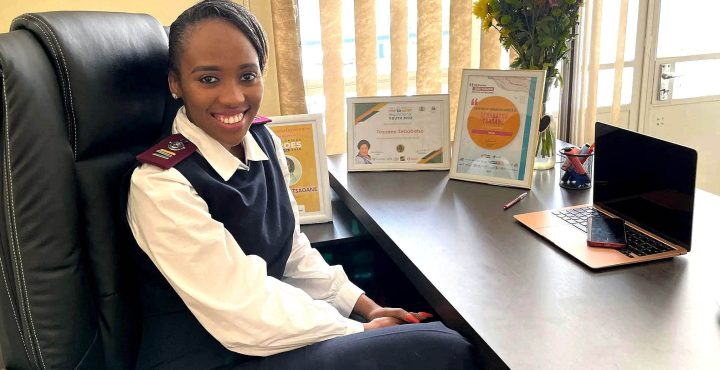SPOTLIGHT WOMEN IN HEALTH
Founder of Black Women Arise on a mission to help women improve their sexual and reproductive health

Being a midwife is not a career, says Sebabatso Tsosane – for her, it’s a calling. Refilwe Mochoari spoke to Tsosane, a midwife, lecturer and founder of the Free State-based organisation Black Women Arise, about her passion to empower women with knowledge about their sexual and reproductive health. This is part of Spotlight’s Women in Health series.
Sebabatso Tsosane says that being a midwife is not a career – for her, it’s a calling. She says she was born into this world “to serve other women”.
Tsosane’s interest in sexual and reproductive health was sparked when she ended up in hospital after being diagnosed with endometriosis. She is a registered midwife. She tells Spotlight that she suffered from severe and painful menstrual cycles for years.
Endometriosis is a condition in which tissue that normally lines the uterus grows outside the uterus.
With endometriosis, the tissue can be found on the ovaries, fallopian tubes or intestines, and the most common symptoms are pain and menstrual irregularities. It was her own experience that made her realise that many women probably suffer in silence and have little knowledge about their sexual and reproductive health.
Born in a village called Sediba in Thaba Nchu just outside Bloemfontein, Tsosane is also a lecturer at the University of Free State’s School of Nursing and has begun work on a master’s degree in nursing, with a focus on sexual and reproductive health.
In 2016, Tsosane founded the non-profit Black Women Arise – she is also the CEO.
Limited knowledge
“For years,” Tsosane says, “I was suffering from severe period pains and believed that it was normal for me as a woman to experience heavy and painful periods. During my years of study to become a nurse, I decided to seek medical help.”
She says a long, difficult process followed.
“I underwent test after test and eventually had to go for laparoscopic surgery to find out what was wrong with me. My concern was if I, as a nursing student in the medical field, have no knowledge about this, what then about ordinary women – those in rural areas who have no resources and access to information?
“I knew from that moment that I needed to do something,” Tsosane says.
“I saw a need,” she says. “Working in facilities where women come with diseases like cervical cancers, which is really preventable, and women not booking for their antenatal visits when they are pregnant… I realised that [many] women are not educated and informed about sexual and reproductive health.”
She says, in most cases, women seek help only when they are struggling to fall pregnant. Often it is too late because by then, their fertility may already be compromised.
Black women arise
For many women in rural areas and disadvantaged communities, there is a lack of access to resources, information and reproductive healthcare services. According to a World Health Organisation fact sheet, delivering comprehensive sexual and reproductive rights interventions is an essential component of universal healthcare.
But based on a report released this week by the Stop Stockouts project, South Africa still has challenges to iron out in providing basics such as contraceptives.
With Black Women Arise, Tsosane says she wants to support women and girls in rural and disadvantaged communities by helping them to get access to quality sexual and reproductive health information and services.
“This will help them to make informed and responsible decisions for themselves and their families,” she says. “Women are the backbone of our society and if we heal them, we heal a community and therefore heal a nation.”
Partnerships
Pharmaceutical company Bristol Myers Squibb recently awarded Black Women Arise a grant to do cervical cancer screening in the Free State. With the grant, they purchased a mobile clinic which Tsosane says is very helpful for outreach in rural areas.
“So, we bring them mobile clinics to receive pap smears, cervical cancer screenings and education,” she says. They work with the provincial health department to ensure smooth referrals when needed.
Fighting stigma
“We also strive to destigmatise sexual health in these communities,” she says.
“Many women still do not get pap smears regularly. In rural areas, many women do not even know what a pap smear is, and this is where our projects come in.
“We provide and organise sexual reproductive training in these communities and teach women and girls about sexual health. We also create platforms where talking about sexual reproductive health is normal, and that women do not have to suffer in silence.”
“We have seen how girls and women skip school and work because of period pains and heavy menstruation. We have seen how many women are suffering or have died from cervical cancer because of the lack of information.”
Mrs SA and ‘boss moves’
Tsosane says she is now at a point in her life – at 27 – where she is “just so excited” about everything that she does. She plans to pursue a PhD after her master’s studies.
“I have always been a girl that loves beautiful things… during my days at the University of Free State, I participated in local modelling competitions,” she says.
In 2020 (she married in 2019), Tsosane participated in the Mrs SA pageant. “I jumped at the opportunity, seeing it as a chance to be a voice and advocate for women’s health,” she says.
“The Mrs SA competition challenged me in ways that I could never imagine,” she says. “But it has helped me so much as a woman [trying to make it] in business.
“So, apart from being a midwife, I just want to continue to make ‘boss moves’.” DM/MC
This article is part of Spotlight’s 2022 Women in Health series.
This article was published by Spotlight — health journalism in the public interest.






















 Become an Insider
Become an Insider
Comments - Please login in order to comment.